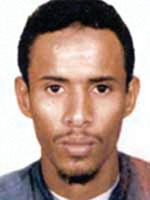|
|
|
Fahd Mohammed Ahmed al Quso. |
The US State Department has designated an al Qaeda in the Arabian Peninsula operative who is wanted for his involvement in the USS Cole attack in 2000 and who currently leads a terrorist cell in Yemen.
Today under Executive Order 13224, the State Department added Fahd Mohammed Ahmed al Quso to its list of specially designated global terrorists. The designation allows the US to freeze his assets, prevent him from using financial institutions, and prosecute him for terrorist activities. Quso was also added to the United Nations (UN) 1267 Sanctions Committee’s Consolidated List of individuals linked to al Qaeda and the Taliban.
The designation of Quso by State refutes reports from October which claimed that he was killed in a US Predator airstrike in Pakistan’s tribal agency of North Waziristan.
“We wouldn’t have designated him if we believed him deceased,” Jason Blazakis, the chief of the US State Department’s Terrorist Designations Unit, told The Long War Journal.
In October, US intelligence officials warned The Long War Journal that the US has been unable to confirm Quso’s death. Al Qaeda did not release a martyrdom statement announcing Quso’s death.
Quso is considered to be a senior AQAP leader. According to State, he now leads an al Qaeda cell in Yemen, and “is connected to other designated AQAP senior leaders, including Anwar al Awlaki [a top ideologue and propagandist], Nasir al Wuhayshi [AQAP’s leader], and Said Ali al Shihri [AQAP’s deputy leader].” In May 2010, he appeared on an AQAP propaganda video and threatened to attack the US and its interests abroad, including embassies and warships.
Quso is wanted by the FBI for his role in the bombing of the USS Cole in the port of Aden, Yemen, in October 2000. The suicide attack on the warship killed 17 US sailors.
Quso is known to have provided fund to a key planner of the September 11, 2001 attacks on the US. He was detained by Yemeni security forces after the Sept. 11 attacks, but escaped from prison in 2003. He was later recaptured in 2004, but released again by the Yemeni government in 2007, and quickly rejoined al Qaeda in Yemen.
Until recently, Quso is known to have operated in the open in Yemen, particularly in Yemen’s Shabwa province. The Yemeni government refused to detain Quso, despite US requests.
The US targeted Quso and other AQAP leaders, including Wuhayshi, Shihri, and Awlaki, in an airstrike on Awlaki’s home in Shabwa province on Dec. 24, 2009. All four commanders survived the strike.









4 Comments
Dead man walking… go get ’em boys…
Why wasn’t this done the moment he was a suspect?
personally i think that there are about three chances to kill or capture a known terrorist. if one fails three times
then its too late…this one will go off…unfortunately.
one terrorist three attempts…thats about it
Once again this is the Treasury aiming financial sanctions at a terrorist. The CIA and military are already looking for him.
The interesting point is he was suspected killed in a drone strike. Clearly there is information that indicates that he isn’t dead.